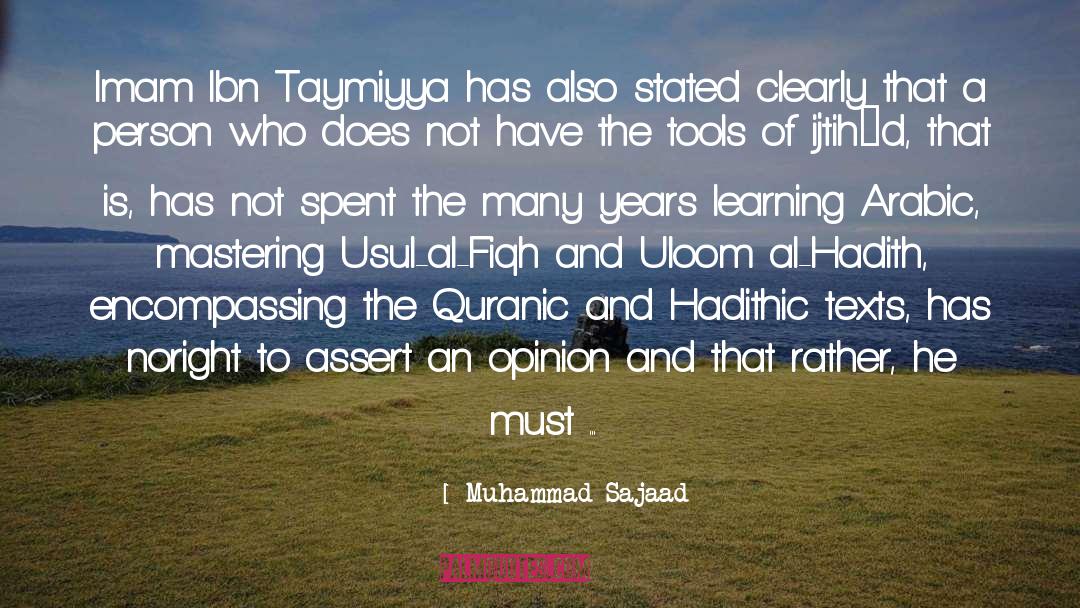Quotes About Fiqh
Enjoy collection of 6 Fiqh quotes. Download and share images of famous quotes about Fiqh. Righ click to see and save pictures of Fiqh quotes that you can use as your wallpaper for free.
As a legal text, the Qur'an reflects its origins in a tribal or clan-based society, particularly on issues concerning inheritance, male guardianship, the validity of a woman's testimony in court, and polygamy. This is even more obvious in the hadith, the compilation of sayings attributed to the Prophet or documenting his actions. This combination of the Qur'an and the example of Muhammad forms the basis of sharia. The derivation of these legal rules, known as fiqh, is the responsibility of Islamic jurists and takes place on the basis of ijma (consensus). When conflicts of interpretation arise, scholars consult the Qur'an and hadith. ~ Ayaan Hirsi Ali

Imam Ibn Taymiyya has also stated clearly that a person who does not have the tools of ijtihād, that is, has not spent the many years learning Arabic, mastering Usul-al-Fiqh and Uloom al-Hadith, encompassing the Quranic and Hadithic texts, has no
right to assert an opinion and that rather, he must do taqlīd. ~ Muhammad Sajaad

Like the pioneering Muslim scientists, Al Bukhari insisted on an empirical, organized method in the science of fiqh and hadith ~ Firas Alkhateeb

Unfortunately, we live in an era where once a person learns a bit of the Arabic language and memorizes the translation of the Qur'an, he thinks he has the right to make his own opinions regarding the Qur'an. The Blessed Prophet s said, "Whosoever explains the Qur'an from his own opinion is wrong even if he is right."
Modernists generally ignore the opinions and exegesis of the pious predecessors [al-salaf al-salihun] issuing fatwas that are based on their own whims. In our time, the modernist desires to embody all the greatest attributes in every field. If he can write simple Arabic, articulate himself in his native language, or deliver impromptu speeches, he sees himself the teacher of Junaid and Shiblõ in Taüawwuf and also a mujtahid in fiqh (Islamic jurisprudence). He introduces new ideas in the exegesis of the Qur'an without concern for the opinions of the pious predecessors or that his opinions contradict the aúódõth of the Blessed Prophet (PBUH).He is whimsical in matters of Dõn. He states his heart's desire no matter how much it contradicts the Qur'an and the Sunna. Despite this, no one discredits him, protests his incompetence, or shows him his deviation.
If one gathers the courage to say, "This is against the teachings of the pious predecessors," he is immediately branded a sycophant of the pious predecessors. He is condemned as ultra-orthodox, anti-intellectual, and someone not attuned to the modern world. Conversely, if a person rejects the e ~ Shaykh Muhammad Zakariyya Kandhlawi

Imam Shatibi, amongst other jurists, has explained extensively the dangers in leaving Fiqh unregulated, saying ; ultimately, the very purpose of the Shariah - which is Takleef, (that is charging people with duties and responsibilities) would become defunct as lay people, through caprice and moral corruption, created their own desirable opinions. ~ Muhammad Sajaad

Ibn Mas'ud said, "When 'Umar died nine-tenth of all knowledge vanished with him." The people were shocked and said, "How can this be when among us now are still many of the great companions?" Ibn Mas'ud replied,"I am not speaking of the knowledge of fiqh and the science of judgements, I'm speaking about the knowledge of Allah." This struggle of isolation, hunger, sleeplessness, weeping, fear and endless service to men was for this end. The journey is only for knowledge of Allah and the whole of it lies in detachment from everything that passes away. First from what is displeasing to Allah, then from one's self-illusion and desires, and then from all men and all otherness until there is only isolation and extreme nearness to Allah. ~ Khalid Muhammad Khalid

